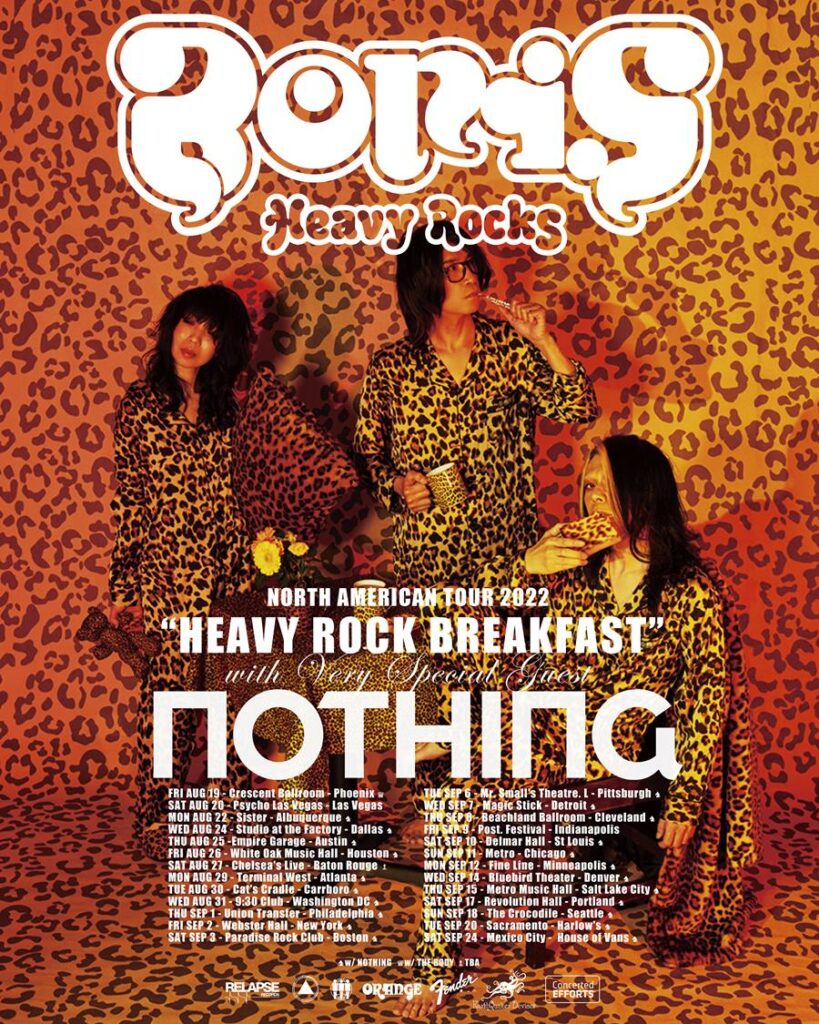

The legendary experimental outfit reflects on their ‘Heavy Rocks’ series and explains how their music is a reactive response to their creative environment.
Now approaching three decades as a fixture in extreme music, Japanese collective Boris has showcased an incredible commitment to own personal artistry in never repeat themselves. What remains more impressive than the band’s creative breadth and their broad spectrum of work – the kind of range that makes categorization almost laughable – is prolific pace the band has maintained throughout their accomplished career.
Since the mid-90’s, Boris has never gone more than a couple of years without completing a new project, sometimes releasing multiple efforts in the same year. To better frame the band’s rate of output, within the last two years alone, Boris has completed three full length albums (2020’s ‘NO’ and the companion in 2021’s ‘W’ are among the pandemic-era’s best albums regardless of genre) and a split compilation all without prioritizing quantity over quality.
Among the most progressive, forward-thinking, inventive contributors in their respective space, Boris maintains a unique relevance, both rooted in their rank as extreme music pioneers and timely as game-changing trailblazers that are still redefining the limitations of modern extreme music. Boris has achieved an elite tier of craftsmanship that positions the band as both classic and contemporary – further underscored by a body of work that speaks to their collective pursuit of artistic evolution.
Throughout the band’s three decade tenure, their Heavy Rocks series has function as both benchmark and barometer, interspersed ten years apart and serving as a reflection of the health and heft of rock music in real time. For the most recent installment of Heavy Rocks, Boris executes their take on rock music in the post-pandemic world in a collection of songs that are dynamic in range and pummeling in execution. From D-beat to raucous rock n roll, from industrial to noise punk, the significance of Heavy Rocks goes far beyond style points and asserts that more than a generation into their term, Boris remains an ambassador and an advocate for outsider art.
As one third of the ageless aggressors of Boris, multi-talent drummer and vocalist Atsuo, recently spoke about what drives the band’s motivation after all these years, the prism that developed their vision for the latest edition of Heavy Rocks, and how the band views themselves as documentarians that embrace extreme music as a means of connecting the world around them.

(Translated by Kasumi Billington)
30 years in and the band seems to be as prolific as ever. In the last couple of years alone, NO, W, and now Heavy Rocks all showcase varying degrees of artistry from the same core unit. Do you write songs with the intention of not repeating yourself or is the process much more organic?
I’m not sure if it’s organic or not, but like the movie Omen, we make music as though something is attached to us. Around the time we made and released NO was when the pandemic had begun to deeply affect our activities and lives, and the work reflected the state of the world and our own mental state at the time. NO was about healing through the roaring sounds, and W was a work that brought awakening through serenity/silence. After W, the band continued to produce work at a tremendous speed – including a split, compilation collaboration, and another album. Then after, Heavy Rocks was born, which seemed to symbolize the 30 year anniversary mark. So far, we’ve released two other albums with the same title Heavy Rocks each a decade apart or so, and they each have summarized and represented the latest heavy rock of that time.
When making these, we’ve never gone down the same process. In a rapidly changing situation, we’re constantly receiving new stimulation from the world, and we continue to express these impulses and impressions through the form of music.
Thematically, NO and W seemed to be written as a direct response to the turbulence of the last two years. Heavy Rocks seems much more raucous, celebratory – with less social commentary. Was recording this album less intense for you emotionally given how weighty the tone of the two previous records were?
Heavy Rocks clearly shows that we’re entering a new phase. Since we’re already living in this new world, we can’t dwell on the past forever. The events from the last two years will be deeply carved into the history of rock. Like you mentioned, the last two years were turbulent times. But for us, it was also a two year period in which we were able to explore the history and secrets of rock, which is important to us. It might be fate that we were able to welcome our 30th anniversary with this timing. Heavy Rocks is a work full of secrets of rock that can’t be put into words. Let’s share those secrets with each other.
How do you feel about being coined as an “experimental” band or an “extreme” band. Do you feel like those descriptors apply or is that just a way of people being able to explain Boris in a convenient way?
When listening to or watching Boris, I hope that it’ll always be a new experience for the audience. To not just know, but also to feel. We would love for you to continue to experience the vivid and mellow time in the moment of “now.” It has a long history, and while it is old-school rock, we hope that you can always have a new experience. I think that being called “experimental” is an appropriate categorization by writers who have experienced our music. The love for rock can sometimes have terribly destructive techniques. In that sense, it could be described as “extreme”.
Given the band’s broad spectrum, is it tough to narrow down the focus sometimes and streamline the flood of ideas into a cohesive album?
We’d love for you to think of our album as one visual piece of work. Multiple sequences become a “song,” and in that, there are various scenes, people, and happenings included. Those scenes or sequences connect, and become one story = album. It may be hard to picture if you have the mindset that something is “music,” but each time, we create an album feeling like we are making a new movie. Since it’s basically us making our own documentary movie, it has never felt difficult.
Nothing lasts 30 years yet Boris is as relevant as ever and producing at their prime. What keeps the band motivated to operate at such a prolific pace and not having to rely on nostalgia to appeal to fans?
The times spent facing music and experiencing new events allow our spirits to stabilize. Even in this post-pandemic world, fans and listeners worldwide continue to support us, and we’re always connected. We hope that by continuing to create new work, we’ll be able to meddle with the world, increase the number of wonderful things in this world, and that great things happen to those who support us as well.
In terms of arrangements, the singles from Heavy Rocks have all been very intense. These all feel like fun songs to perform. How important is it to find a balance of keeping the process fun while still exploring new creative terrain?
When a song is born, and it lands upon our bodies, the vision we see is often the scenery from the stage. From there, new terrains are explored in all directions. It’s a very natural process. We can’t just release an album and feel that it’s completed. We need to perform at tours where it keeps evolving and changing, as it fully captures the energy of the audience. With that, new expressions are born in these songs, and provide our performing selves with stimulation and new ideas. We get to experience this on the “Heavy Rocks” tour again, for the first time in three years. Responding directly to the audience – this is an extremely important factor.
This is the third Heavy Rocks in the series of albums of the same name. Given these releases are all about a decade apart, is the idea to present a snapshot of the current landscape of heavy music in those respective eras? Do you feel like Heavy Rocks (2002), Heavy Rocks (2011) and now Heavy Rocks (2022) are a product of the current climate of heavy music?
How the world is at the moment in time directly influences us. All of our work could be considered a documentary. Not only do they contain objective facts, but also our thoughts of trying to live and subjective stories. This work can clearly be seen as work born in a post-pandemic world.
Boris hasn’t gone more than a few years since 1996 without releasing a new record. What would be the determining factor that would cause you to think about slowing down?
We ourselves enjoy the new world, and share that with the audience. If we’re not truly enjoying ourselves, our work would be terribly one dimensional and include contents that couldn’t reach the people. For that reason, we want to stay true to ourselves and enjoy the world.
Where does Heavy Rocks rank for you in terms of the catalog of Boris?
They’re difficult to rank. Each and all of our work are like precious children, so we can’t rank them. Music isn’t a competition. There’s no way to rank them, there are no correct answers. That’s the value of music, isn’t it? In a world where there are no rankings or correct answers, each person determines what is important themselves. Music and art serve as important materials when we look at such processes in our lives, and they help enrich us.
Heavy Rocks (2022) is available now via Relapse Records. Get the album – HERE.

BORIS is currently on their North American ‘Heavy Rock Breakfast’ Tour along with standouts NOTHING. See remaining dates and cities below.
